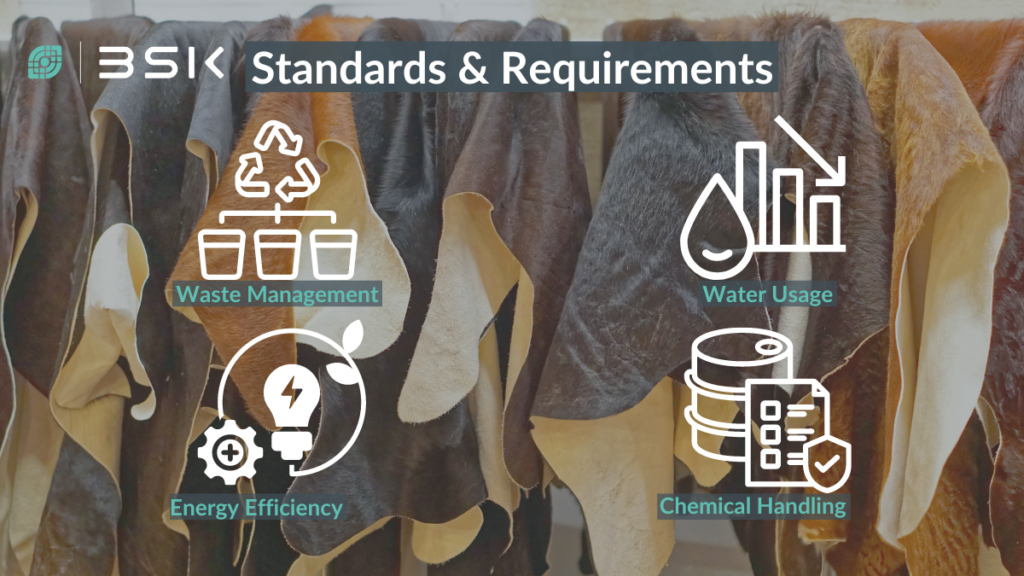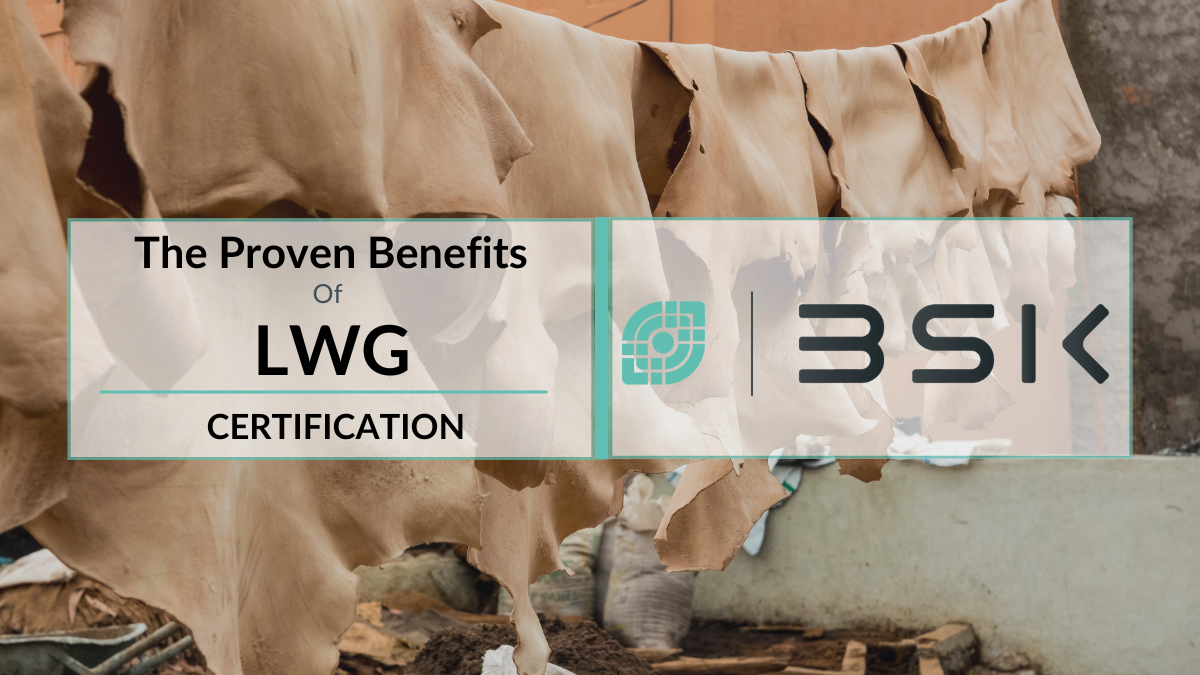The LWG certification in the bag-making world is key. They’re like a secret handshake, showing you’re in the club of quality and trust. This is where the whole game changes. With the right certification, you’re not just a player but you’re setting the standards and proving your bags are top-notch. It’s all about ensuring customers know they’re getting the real deal, no compromises. Plus, it’s a smooth way to show off your eco-friendly and ethical chops.
Overview of LWG Certification
Alright, let’s dive into this. We’re talking about the LWG Leather Manufacturer Standard, a big deal for those in the leather game. This certificate first came to be in 2005, it aimed at making sure tanneries and leather producers are doing their best when it comes to being kind to the planet. It’s all about checking if they’re managing waste, water, energy, and chemicals are being used responsibly.
Fast forward to 2021, and the scene has evolved remarkably, transitioning to version P7. It’s no longer solely focused on being green; there’s a broader, more vibrant approach now, incorporating environmental, social, and governance (ESG) metrics. The scope of consideration has expanded significantly, examining aspects ranging from chemical management to employee treatment, ensuring thoroughness in tracking the origins and destinations of goods and services. This comprehensive strategy encompasses 17 distinct areas, guaranteeing that no stone is left unturned in its pursuit of sustainability and ethical operations.
Enhancing Sustainability in Leather Production
From October 2023, subcontractors involved in the leather production industry are mandated to provide detailed data on their consumption of water, energy, and other resources for each specific process involved in their operations. This comprehensive disclosure is crucial for passing the audit. It’s designed to enforce transparency and encourage sustainable practices within the industry.
Moreover, there has been an update regarding the certification process for new applicants and facilities returning after a period of inactivity. These entities are now required to submit 12 months of operational data as a prerequisite for obtaining a year-long certification. This adjustment aims to ensure that all participants adhere to the same standards of environmental and resource management, regardless of their tenure in the leather production business.
So, whether you’re dealing in raw hides or crafting the final product, keeping on top of these standards is key to staying ahead and doing right by the planet and its people.

Standards and Requirements of the LWG Certification
Alright, diving into the specifics of what this certification is all about, it’s pretty much the gold standard for tanneries and leather producers aiming to be recognized for their eco-friendly practices. A bag factory needs to demonstrate excellence in:
- Waste management
- Water usage
- Energy efficiency
- Chemical handling
Now, to obtain this certification, a bag factory needs to pass an audit that checks out everything from how they manage their environment and keep tabs on chemicals to ensuring they’re following social responsibilities and governance. It’s like being under a magnifying glass for your green creds.
The audit process, initiated in 2005 and significantly updated in 2021, is an extensive examination designed to ensure environmental and social responsibility within production facilities. It meticulously evaluates 17 distinct areas, encompassing waste management, water usage, energy efficiency, chemical handling, and more. This comprehensive approach is aimed at confirming whether a facility adheres to sustainable practices, particularly in manufacturing processes.
A key focus of the audit is on sustainability and the ethical treatment of workers, addressing the crucial aspects of social responsibility. Facilities are scrutinized not only for their environmental impact but also for how they manage their workforce, including working conditions and adherence to labor laws. This holistic evaluation ensures that a facility’s operations are both environmentally sustainable and socially responsible.
Another significant aspect of the audit process is its attention to governance metrics. This includes the oversight of operational practices and the transparency of reporting, especially in regard to outsourced work. Since October 2023, factories have been required to provide detailed information on their energy and water consumption for each specific job. This level of detail ensures accountability and encourages facilities to adopt more sustainable practices by highlighting the direct impact of their operations. Failing to provide this specific data can result in not passing the audit, emphasizing the importance of transparency and accurate reporting in achieving sustainability goals.
Benefits and Significance of the Certification
Key Benefits for Bag Factories
- Increased Supply Chain Traceability & Transparency
- Improved Knowledge & Access to Data
- Resource Efficiency
- Reduced Waste and Emissions
- Improved Chemical Management
- Enhanced Worker Conditions
So, getting this certification is like giving your leather products a major boost. For bag factories and the brands that buy from them, it’s a game-changer. First off, it’s a stamp of approval on your environmental and social ethics. This means you’re not just making bags; you’re doing it responsibly, which is a big plus in today’s world.
The LWG certification isn’t just a pat on the back; it’s your ticket to standing out in a crowded market. Customers trust products made with high environmental and social standards. And when trust goes up, so do your sales. It’s like showing your customers you care, not just about making a profit, but about making a difference. This can really set you apart, especially in markets that value sustainability and ethical production.
But there’s more. This certification also opens doors to new opportunities. Picture this: markets and buyers that were out of reach because they demand high standards? Now, they’re within your grasp. It’s like having a key to new territories and customers who are on the lookout for products that align with their values.
And let’s not forget about the sustainability and social responsibility perks. By meeting the certification’s standards, you’re not just checking boxes; you’re actually contributing to a healthier planet and happier communities. This can boost your brand’s image and make your team proud to be part of what you’re doing.
Certification Process of LWG
The certification process of the Leather Working Group (LWG) involves a detailed preparation and submission of operational data. For a standard 12-month certification, it is essential to compile and present 12 months of operational data. This timeframe is crucial as it reflects the facility’s commitment to sustainable practices over a consistent period. Additionally, for those aiming for a more extended 24-month certification, the requirement doubles, necessitating the submission of 24 months of data.
Since October 2023, the process has introduced a significant update for subcontractors. Subcontractors are now required to provide specific usage data for each job or process they undertake. This change underscores the LWG’s commitment to transparency and accountability throughout the supply chain. Failure to comply with this requirement will result in failing the audit. This update ensures that all parties involved in the leather manufacturing process adhere to the same high standards of eco-friendly practices.
Mandatory Detailed Reporting for Subcontractors from October 2023
Now, if you’re working with subcontractors or you are one, there’s an extra layer. Since October 2023, it’s mandatory to provide detailed usage data for energy, water, etc., for each specific operation. No shortcuts here!
All in all, it’s a process that demands a good chunk of prep, especially in gathering the right data and making sure your facility is up to scratch. But hey, achieving that certification is a pretty solid nod to your commitment to the environment and sustainable practices. Plus, it’s a green light for eco-conscious customers and partners. Worth the effort, if you ask me.
Industry Relevance of the LWG Certification
The Leather Working Group (LWG) certification is important for industries relying on leather, such as fashion, automotive, and furniture. Your favorite leather jacket brand, a swanky car interior, or a chic leather handbag – chances are, they’re all about this certification. Why? Well, it’s because customers and businesses in these fields are becoming super conscious about the environment and ethical standards. They want to know that the leather goods they’re buying or selling aren’t just stylish but also produced responsibly.
Take the bag manufacturing industry, for instance. A brand that nails the LWG certification is basically telling the world, Hey, we care about the planet and we’re not messing around with chemicals or wasting water. This is a big win for the brand’s image and can seriously boost customer trust and loyalty. This certification isn’t just for appearances; it can also lead to improved efficiency and cost savings for manufacturers over time. Of course, while LWG certification is available, there are also a number of other certifications that serve a similar purpose, such as GOTS and Social Accountability Certification. LWG Leather Manufacturer Standard certifications are different in that they aim specifically at tanneries and leather producers
By revamping their production to meet LWG’s standards, they could potentially see a spike in sales from eco-conscious shoppers while also reducing their environmental footprint. It’s a win-win situation that shows just how impactful this certification can be in the right markets.
Conclusion
Alright, diving into the article, we’ve got some key takeaways to chat about. First off, the article lays out some pretty important points about why bag factories should really think about getting certified. It’s a big deal because having that certification can seriously up their game in the business world.
So, why bother with certifications? Well, it’s like a badge of honor, telling everyone you’re all about quality and reliability. It’s not just a piece of paper; it’s a signal to customers that you’re the real deal. Plus, it can open doors to new markets and customers who are on the lookout for products they can trust.
If you’re making bags, consider getting certified. It’s not just about sticking a certificate on your wall. It’s about taking your business to the next level, standing out in a crowded market, and, let’s be honest, it’s good for the bottom line too.
In sum, this article’s really pushing for bag manufacturers to get with the program and get certified. It’s a move that could make a big difference in how they’re seen in the industry and by customers. Check out and see what it could mean for your business.
